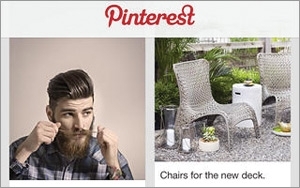 Trying to balance business interests with user satisfaction, Pinterest has decided to remove affiliate links from its platform.
Trying to balance business interests with user satisfaction, Pinterest has decided to remove affiliate links from its platform.
“Recently, we observed affiliate links and redirects
causing irrelevant Pins in feeds, broken links and other spammy behavior,” a Pinterest spokesman explained on Friday. “We believe this change will enable us to keep the high bar of
relevancy and quality Pinners expect.”
Never a huge fan of affiliate business, the pin-based social network has been automatically removing related links for several years.
A few
exceptions were made for those affiliate businesses that were “maintaining good quality," the spokesman tells Social Media & Marketing Daily.
But, not anymore. As a result
of the new policy, Pinterest is expecting clickthrough rates to be faster, while users should encounter fewer broken links.
advertisement
advertisement
“There will also be less irrelevant Pins in the home feed
caused by following some group boards,” the spokesman assures.
“This is not about monetization,” he said. “This is 100% about the Pinner experience and ensuring
relevant content on Pinterest.” While affiliate links may not be part of its plan, Pinterest is aggressively pursuing various monetization opportunities.
Expanding its Promoted Pins
business, the company recent began testing ads in users’ home feeds and other locations.
Pinterest officially launched Promoted Pins at the beginning of the year, after nearly eight months of
testing. Initially, the program gave brands more visibility by featuring their pins in search results and category feeds.
Adding Promoted Pins to users’ home feeds is expected to give
brands greater prominence on the social network, Annie Ta, product manager at Pinterest, said last month.
With the expansion, Pinterest risks turning off users with unwanted ads. But according
to Ta, she and her team are growing to great pains to limit branded pins to those that are “beautiful, relevant and tasteful. If you don’t like a Promoted Pin, you can always hide it from
your feed and tell us why you didn’t like it,” Ta explains. “We’ll use your feedback to improve what you see in the future.”
Regardless of where they appear on
Pinterest’s network, Promoted Pins are always labeled “Promoted.”
Analysts say Pinterest’s ad program remains a work in progress, particularly because it doesn’t
give marketers enough Web-based targeting criteria. “The result of such limited targeting is unclear ad performance,” Nate Elliott, principal analyst at Forrester Research, explained in a recent report.
In its defense, brands that participated in the
Promoted Pins beta program saw a 30% increase in “earned media” — i.e., the share of users who saved a Promoted Pin to a board, according to Pinterest.
Per internal findings,
Promoted Pins are already being “repinned" an average of 11 times — the same as nonbranded pins. To improve its pin recommendation process, Pinterest just recently acquired the machine learning specialists at Kosei.
Among other
applications, Pinterest already uses machine learning — which employs algorithms to glean insights from available data — to suppress spam, identify objects in pictures, and monitor ad
performance.
Venture was first to report on Pinterest’s decision to nix affiliate links, on Thursday.